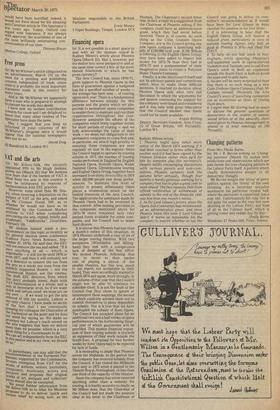Financing opera
Sir: It is not possible in a short space to deal with all the matters raised in Rodney Milnes's article about Phoenix Opera (March 22). May I, however, put the matter into some perspective and at the same time correct a few of the more blatant falsehoods to which he has given currency?
The Arts Council has, since 1970/71, given support to Phoenix Opera in the form of guarantees against a budgeted loss for a specified number of weeks — the average has been nine — of touring opera each year. There is a fundamental difference between subsidy for this purpose and the grants which we also provide to permanent opera companies to enable them to maintain and run their organisation throughout the year. However admirable the efforts of the companies which bring together artists for short periods of touring — and we fully acknowledge the value of their work — we deem our obligations to the permanent companies to come first and, in particular, we attach high priority to ensuring these companies are seen regularly on tour in the regions. Since the Council began to operate its touring scheme in 1971, the number of touring weeks performed in England by English National Opera, Scottish Opera, Welsh National Opera, Glyndeboume touring and English Opera Group, together have increased from thirty-five to fifty in 1974 when 282,000 people saw these performances. To maintain this level of activity in present inflationary times places a tremendous strain on the limited resources of the Arts Council. The applications for assistance made by Phoenix Opera had to be reviewed in that context. After making provision to the companies mentioned above for 1975/76 there remained only very limited funds available for other companies, and the Council had to make hard choices.
It is untrue that Phoenix had less than a month's notice of this situation. In 1973 Phoenix undertook a tour of six of the larger touring theatres. With two exceptions (Wimbledon and Billingham) they met with a conspicuous lack of demand at the box office. We invited Phoenix, following that tour, to revert to their earlier role of playing a circuit of the smaller theatres, but this was, much to our regret, not acceptable to their board. They were accordingly warned in March 1974 and again, more strongly, in the autumn of that year that the Council might not be able to continue to subsidise them. It is not the fault of the Council that they chose to ignore or misinterpret these warnings, the second of which explicitly advised them not to commit themselves to plans dependent on subsidy. Nor is it true that we have quadrupled the subsidy of Kent Opera. The Council has accepted plans for an additional two and a half weeks of opera performances in the forthcoming financial year of which guarantees will be provided. This modest financial expansion of their touring subsidy is towards an expansion of their work outside the South-Fast. A proposal for two further weeks by Kent Opera had to be rejected for lack of funds.
It is misleading to imply that Phoenix serves the Midlands. In the period that the company has received subsidy from the Council, it has visited the Midlands once only in 1973 when it played in the Theatre Royal, Nottingham, to less than one third of the capacity of the theatre.
Since the company has never received anything other than a subsidy for touring, it is hardly accurate to imply, as Mr Milnes does, that the Chairman of the Council had not made the position clear in his letter to the Chairman of Phoenix. The Chairman's second letter was, in fact, a reply to a suggestion from the Chairman of Phoenix asking if the company could have an administration grant, which they had never before received. There is, of course, no such thing as the Cohn Graham Opera Company, nor is the Council .giving any new opera company a launching subsidy of £150,000 next year. If Mr Milnes is referring to the English Opera Group, they have been asked to expect less money for 1975/76 than they had in 1974/75 and a postponement of their imaginative plans to create a National Music Theatre Company.
Finally, it is the Arts Council itself and not its advisory panels and committees which have to make these difficult decisions. It reached its decision about Phoenix Opera only after very full discussion in which the arguments for and against continuing the support for the company were heard and considered and it was only with great reluctance that the Council decided that funds could not be made available.
Angus Stirling Deputy Secretary-General, Arts Council of Great Britain, 105 Piccadilly, London WI.


































 Previous page
Previous page